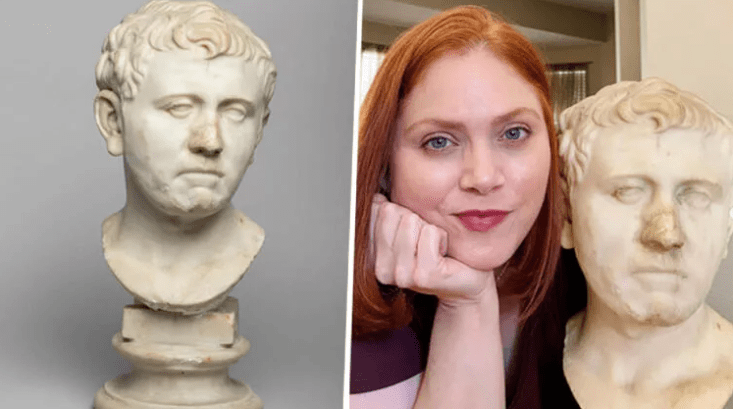Free and Warrior queen Boudicca

Boudicca, a folk hero who maintains his fame today, M.S. He was a Celtic queen (a pagan people who were the ancestors of the Irish) who started a great revolt by uniting the Briton tribes against Roman rule in 60 BC. Boudicca, who has been an indispensable source of inspiration for his people for centuries, maintains his place in history as an important figure against oppression and injustice.
Little is known about Boudicca’s childhood and youth. What is known is based on the survivors of the Roman historians Tacitus’ records titled ‘Agricola’ (98 AD) and ‘Annals’ (AD 109) and Cassius Dio’s’ Boudicca Rebellion’ (c. 163 AD). London is about 100 km. in Camulodunum (present day Colchester) in the northeast of M.S. He is believed to have been born in the year 30, and his name Boudicca means ‘victory’ in the Celtic language. Its name was pronounced Boudica in Briton, Buddug in Welsh, and Boadicea or Boadacaea in Latin.
Queen Boudicca died at the age of 61, as far as is known. He was the wife of Prasutagus, king of the Iceni tribe of the Celts, who lived in eastern Britain in what is now Norfolk and Suffolk. There is no information about his siblings or parents in the historical records.
YEARS TO REVOLT
Boudicca married King Prasutagas when he was 18 years old. The Roman Emperor Claudius of the period, M.S. When he conquered Southern England in the 43rd, the vast majority of Celtic tribes were forced to surrender or migrate. However, the Romans allowed the Iceni to remain independent provided it served Rome.
The Roman occupation increasingly led to new Roman cities, a greater military presence, and attempts to suppress Celtic religion and culture. In addition to the heavy taxes imposed, there were also some economic games to borrow the local population.
M.S. In 47 BC, the Romans forced the Iceni tribe to disarm, drawing the anger of the Celts. The grants given by the Romans to King Prasutagus were redefined as ‘debt’ by the Romans in the following months. Prasutagus M.S. When he died in 60, he left half of his kingdom to his daughters and half to Emperor Neron in exchange for his debts. Prasutagus hoped that his gesture would give his family some protection. However, the local Roman government saw this decision as an opportunity to consolidate their control over the Briton area. The commanders ordered the Roman army to kneel the people of the region.
The Romans came with a great army; but instead of settling in half the kingdom, they took control of the whole. According to Tacitus, in an attempt to humiliate the former rulers, the Romans publicly beat Boudicca and raped their two royal heirs. As if this were not enough, they confiscated the property of many Iceni families and sold most of the royal family as slaves.
The historian Dio, on the other hand, has an alternative story of rape and non-violence. In his version, the money-lender Seneca, a Roman mercenary, invites the British to borrow money from him. On the same day, Roman Governor Suetonius decides to attack Wales, taking with two-thirds of the Roman army in England. Meanwhile, Queen Boudicca meets with the leaders of the Iceni, Trinovanti, Cornovii, Durotiges, and other tribes, and they share their grievances about the Roman frauds and the suppression of their religious lives. At the end of the meeting, they decide to rebel against the Romans and expel them from their land.
Tacitus provides the following information on the beginning of the rebellion in the Annals: “After a long and rich and prosperous period, Iceni King Prasutagus had chosen his two daughters as joint heirs to the emperor. Prasutagus was hopeful of his obedience to protect his kingdom and household from attack. But the situation was reversed. (…) First, his widow Boudicca was arrested and their daughter was raped. (…) The king’s relatives were treated like slaves. And the humiliated people of Iceni feared the situation would get worse, then they were demoted (from royal) to provincial status. So they rebelled. ”
Historical records differ as to why local Roman commanders performed these actions. Some say that the Roman governor, Gaius Suetonius Paullinus, was tired of the constant rebellion of the Celtic tribes. According to others, Prasutagus had left large debts to his tribe, and because his wife Boudicca refused to repay them, the Romans beat him and humiliated him in front of his people. Some historical records show that Boudicca’s daughters were raped by Roman soldiers. Other tribal leaders within the kingdom were subjected to similar humiliation. The Romans imposed heavy taxes when they broke up tribes, they also occupied tribal lands and tried to suppress Celtic religious ceremonies.
BOUDICCA’S WARS
During this period, Governor Suetonius went on a military operation in North Wales. Boudicca saw this as an opportunity to act. He secretly met with the leaders of other tribes who supported the uprising against the Romans. As a result of the meetings, some historians believe that an army of nearly 100,000 fighters was formed.
Like other Celtic women, Boudicca was trained as a warrior in combat techniques and use of weapons. Although he lacked experience, he seemed to have a brilliant military mind. Boudicca’s goal was not only to avenge himself and his daughters, but to completely destroy Roman rule in Britain. His army drew up a plan to attack the three major Roman cities. His first goal was Camulodunum, the city of his birth. It was also the capital of the Roman Briton (Britain) and a symbol of their rule. With the immense power he had gathered, Boudicca and the rebel army had no hesitation to destroy the city and slaughter its people.
Suetonius heard about the revolt and quickly advanced his troops to Wales. It made its way to Londinium (London), a small but important financial center in Britain. Suetonius, who came with only a small force, soon ordered his evacuation, as he could not defend the city. The rebels quickly entered the panicked town and cleared the Romans from there. Then they headed to Verulamium (St Albans) and swept away even the slightest sign of resistance in the city. Boudicca and the forces under his command managed to destroy the three most important cities of the Roman Briton, including the capital, in an incredibly short time. According to historians, the forces under Boudicca had killed more than 80,000 Roman soldiers and civilians.
HOW DID BOUDICCA?
The Romans were embarrassed by this defeat. Their highly trained army had been flattened by a group of ‘barbarian rebels’ led by a woman. Governor Suetonius recruited new forces from neighboring cities to crush the rebellion. The location of the last war is unknown, but it is believed to have taken place in the West Midlands, on the Watling Road, a major road that now runs through Britain.
As Boudicca’s victories spread, forces from other villages and towns joined the rebel army. Suetonius knew that the Roman army had superior tactics, training, and weapons, but due to the low number of his army, he preferred to fight in a narrow area where the rebels could not attack him.
When the rebels’ weapons and tactics failed over Rome’s military tactics, Boudicca had no choice but to back off. Although the exact figures are not known, it is estimated that over 80,000 British rebels and only 400 Roman soldiers died as a result of the war.
As far as it is reported, Boudicca also died here, although the exact cause of death is unknown. He died either from his injuries or by drinking poison with his daughters to avoid getting caught. After the war, the remaining rebel forces and their families were captured and sold as slaves. If Boudicca had abolished Roman rule and changed the course of history, this war would probably be a great victory. However, the Romans remained in Briton for another 350 years.
The revolt shook the Roman Empire to its capital. After that period, they took care to be more respectful and fair towards Britons.
Boudicca’s legacy had taken its place as one of the most daring acts in history. His actions challenged Rome’s domination and arrogance in Britain. Emperor Neron was considering leaving Britain for a short time, but instead replaced Governor Suetonius Paullinus with a more conciliatory governor, Publius Oetronius Trupilianus. In the aftermath of the riots, the Romans spent years building new buildings and improving security in Britain.
Stories penned by Tacitus were published in Europe during the Renaissance and spread to different countries. In her memoirs, Queen Elizabeth stated that she had read these historical records and was inspired by Boudicca to maintain the same understanding and determination while fighting foreign powers like Spain. Queen Victoria was also inspired by Boudicca’s story and had a statue of Boudicca erected at the north end of Westminster Bridge.
This pagan Celtic queen, named Boudicca, had bowed to Rome, carrying the sword of God, and painfully demonstrated that they would never submit to the Romans by destroying the most magnificent cities she had founded in Britain.
resources
https://www.ancient.eu/Boudicca/
https://www.thoughtco.com/boudicca-boadicea-biography-3528571
https://www.historyofroyalwomen.com/boudicca/boudicca-celtic-queen-defied-rome/
https://www.biography.com/people/boudicca





